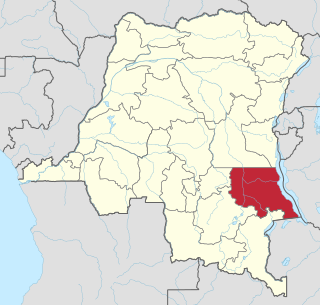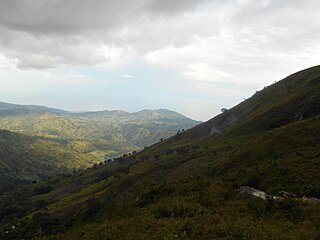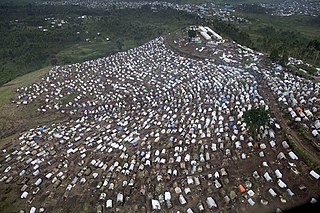The earliest known human settlements in what is now the Democratic Republic of the Congo have been dated back to the Middle Stone Age, approximately 90,000 years ago. The first real states, such as the Kongo, the Lunda, the Luba and Kuba, appeared south of the equatorial forest on the savannah from the 14th century onwards.

The Ituri conflict is an ongoing low intensity asymmetrical conflict between the agriculturalist Lendu and pastoralist Hema ethnic groups in the Ituri region of the north-eastern Democratic Republic of the Congo (DRC). While the two groups had fought since as early as 1972, the name "Ituri conflict" refers to the period of intense violence between 1999 and 2003. Armed conflict continues to the present day.

The Kivu conflict is an umbrella term for a series of protracted armed conflicts in the North Kivu and South Kivu provinces in the eastern Democratic Republic of the Congo which have occurred since the end of the Second Congo War. Including neighboring Ituri province, there are more than 120 different armed groups active in the eastern Democratic Republic of Congo. Currently, some of the most active rebel groups include the Allied Democratic Forces, the Cooperative for the Development of the Congo, the March 23 Movement, and many local Mai Mai militias. In addition to rebel groups and the governmental FARDC troops, a number of national and international organizations have intervened militarily in the conflict, including the United Nations force known as MONUSCO, and an East African Community regional force.

The Allied Democratic Forces insurgency is an ongoing conflict waged by the Allied Democratic Forces in Uganda and the Democratic Republic of the Congo, against the governments of those two countries and the MONUSCO. The insurgency began in 1996, intensifying in 2013, resulting in hundreds of deaths. The ADF is known to currently control a number of hidden camps which are home to about 2,000 people; in these camps, the ADF operates as a proto-state with "an internal security service, a prison, health clinics, and an orphanage" as well as schools for boys and girls.

The Batwa–Luba clashes were a series of clashes in the Democratic Republic of the Congo (DRC) between the Pygmy Batwa people, and the Luba people that began in 2013 and ended in 2018.
The 2020 Democratic Republic of the Congo attacks were a series of attacks which took place in 2020. The attacks were mostly carried out by the Allied Democratic Forces (ADF), a radical Islamist rebel group and the Cooperative for the Development of Congo (CODECO), an agricultural and religious group made up of ethnic Lendu people. The attacks left at least 1,316 people dead and 132 injured.

CODECO is a loose association of various Lendu militia groups operating within the Democratic Republic of the Congo (DRC). The name is an abbreviation of the group's lesser-known full name, the Cooperative for Development of the Congo, sometimes also styled the Congo Economic Development Cooperative.
Events in the year 2021 in the Democratic Republic of the Congo.
Attacks were carried out by various armed groups in the Democratic Republic of the Congo in 2021 and 2022. The attacks have killed 629 and injured 321. At least 82 perpetrators were also killed and one injured in these attacks.
Events in the year 2021 in the Republic of the Congo.

Drodro is a refugee camp in Djugu territory, located in the Ituri province of the Democratic Republic of the Congo.

Djugu territory is a district of Ituri, Democratic Republic of the Congo. Its capital is also named Djugu.
Events of the year 2022 in the Democratic Republic of the Congo.
Events of the year 2023 in the Democratic Republic of the Congo.

The Democratic Republic of the Congo (DRC) has one of the largest populations of internally displaced persons in the world. The International Organization for Migration estimates that in the first half of 2023, conflict in the eastern DRC displaced nearly a million additional people, which along with existing displaced population, brought the total number of internally displaced people in the country to an estimated 6.1 million. The issue has been ongoing for many years, with millions of displaced persons forced from their homes, often repeatedly. The term internally displaced persons (IDPs) refers to movements of people within the DRC, which are a distinct population from refugees who fled to the DRC from other countries, such as the 1.2 million Rwandan refugees who arrived during the Great Lakes refugee crisis in 1994.
Events of the year 2024 in the Democratic Republic of the Congo.
On January 19, 2023, the United Nations investigators discovered the bodies of forty-two civilians in the village of Nyamamba, Ituri Province, Democratic Republic of the Congo, and seven bodies in the village of Mbogi, in the same province. The victims were killed over the weekend by suspected CODECO between January 14 and 15.
On the night between May 16 and 17, 2020, militants from the Lendu CODECO killed twenty-two civilians in the Hema village of Ndjala, in Ituri Province, Democratic Republic of the Congo.
The Ituri Self-Defense Popular Front, more commonly known as Zaïre-FPAC, is a decentralized Hema militant group or groups operating in the Democratic Republic of the Congo(DRC). They were formed in response to Cooperative for Development of the Congo (CODECO) expansions and the ongoing Ituri conflict. Very little is known about the group, their organizational structure, or members. The group has committed several massacres and atrocities, and was "strongly condemned" by the United Nations in 2023 for their human rights abuses.
At 2am on March 15, 2021, jihadists from the Allied Democratic Forces attacked the town of Bulongo, Beni Territory, North Kivu, Democratic Republic of the Congo, killing 15 people.








